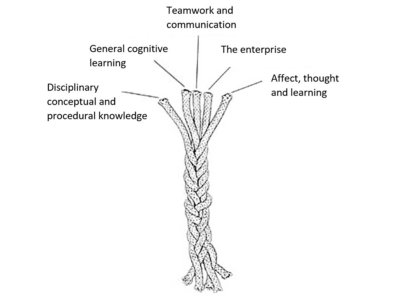Challenge-based learning is becoming an important learning and teaching strategy at Eindhoven University of Technology (TU/e, 2018). During challenge-based learning, students work in multi-disciplinary groups on open-ended and real-life challenges that are provided by stakeholders in the field of engineering (Membrillo-Hernández et al., 2019; Rosén et al., 2018). Teachers are expected to work as coaches, who support and guide the learning process of the students. Both ‘traditional’ teacher-based instruction (e.g. in lectures) and challenge-based learning (and coaching) are currently practiced at Eindhoven University of Technology.
 In this study, Martina van Uum and Birgit Pepin have investigated what students perceive to learn in traditional teacher-based education as compared to challenge-based learning in order to know the benefits of the different types of education.
In this study, Martina van Uum and Birgit Pepin have investigated what students perceive to learn in traditional teacher-based education as compared to challenge-based learning in order to know the benefits of the different types of education.
Martina van Uum
Learning gains framework
To investigate students’ perceived learning gains, in a previous study we had developed a learning gains framework for higher engineering education that consisted of five interwoven knowledge strands: 1) Disciplinary conceptual and procedural knowledge, 2) General cognitive learning, 3) Affect, thought and learning, 4) Teamwork and communication, and 5) The enterprise (Van Uum & Pepin, 2019).

Figure: Learning gains framework for engineering education (amended from National Research Council, 2001)
Analysing learning gains
In the current study, we used the framework to analyse students’ learning gains in traditional versus challenge-based education. We formulated the following research question: Which (kinds of) learning gains do engineering students perceive in challenge-based learning as compared to traditional learning?
Thirteen students who had experience in both traditional and challenge-based courses were included as participants in our research. Their studies focused on “science” (e.g., Applied Mathematics), “core engineering” (e.g., Mechanical Engineering), and “social engineering” (e.g., Sustainable Innovation). In small groups, we interviewed them about their learning gains at the university. After the students had explained their learning gains, we implemented the strategy “pie chart drawing”. During this strategy, the students divided a circle into different parts that represented their self-reported learning gains and attached a percentage to each part, to show the size of each learning gain. The students commented on their courses in which the learning gains were acquired, hence we could establish whether these learning gains were acquired in traditional versus challenge-based courses. In addition to the interview data (in combination with the “pie chart drawings”), students’ written reflections on their learning gains in a challenge-based course were analysed.
Results
The results of the interviews, in combination with the “pie chart drawings”, showed that students perceived learning gains regarding disciplinary conceptual and procedural knowledge acquired in traditional courses. During challenge-based learning, they said they gained skills regarding teamwork and collaboration with stakeholders. Other learning gains, such as general cognitive learning (e.g., critical thinking), communication with other students, and affects and thoughts related to learning (e.g., taking into account the social context) were acquired in both traditional and challenge-based courses.
Moreover, the results of students’ written reflections on a challenge-based course matched the results of the interviews. For example, learning gains in disciplinary conceptual and procedural knowledge were not often mentioned in students’ written reflections, whereas learning gains regarding the collaboration with stakeholders were frequently mentioned. A recommendation for future research is to investigate the difference between students’ learning gains in traditional versus challenge-based learning on a larger scale and in different contexts.
Please contact us if you are interested to know more about this study.
Martina van Uum & Birgit Pepin
m.uum@tue.nl b.e.u.pepin@tue.nl
References
Eindhoven University of Technology. (2018). TU/e strategy 2030. Drivers of change. Eindhoven: Drukkerij SNEP B.V.
Membrillo-Hernández, J., Ramírez-Cadena, M. J., Martínez-Acosta, M., Cruz-Gómez, E., Muñoz-Díaz, & E., Elizalde, H. (2019). Challenge based learning: The importance of world-leading companies as training partners. International Journal on Interactive Design and Manufacturing, 13, 1103-1113.
Rosén, A., Högfeldt, A., Lantz, A., Gumaelius, L., Wyss, R., Bergendahl, M. N., . . . Lujara, S.K. (2018). Connecting north and south through challenge-driven education. Proceedings of the 14th International CDIO Conference. Kanazawa: Kanazawa Institute of Technology.
Van Uum, M. S. J., & Pepin, B. (2019, July). Developing a learning gains framework for engineering education. 4TU.Centre for Engineering Education. Retrieved from https://www.4tu.nl/cee/en/news/!/6910/learning-gains-framework/.



